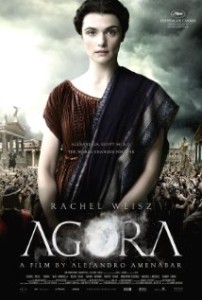 Agora is the Greek word for center, and this 2009 movie is about the many worlds that revolved around the fourth century Alexandrian philosopher Hypatia. There was Alexandria, Egypt as a center – perhaps the center – of learning and culture in the Roman Empire at that time. There was Alexandria as the center of religious and philosophical diversity. There was the maelstrom of repression and destruction by the Christian Empire directed toward Pagans which began before the birth of Hypatia and continued after her death. There was Hypatia as the celebrated center of philosophy in Alexandria, sought for her wisdom by scholars and government officials. And there was the quest for understanding how the universe functions which drove Hypatia.So I really liked the title of this movie, but I have to say that overall I was not impressed. I did like how Hypatia was presented as obsessed with learning rather than with love, although the female porn theme of Hypatia’s devoted slave seemed a bit gratuitous to me. I also liked that the movie showed Christians of the Roman era as the intolerant fearful thugs they were, rather than the martyrs they liked to portray themselves as. The movie also underscores the repression and violence shown by Christians to the Jews. But the film was greatly marred for me by the long and frequent scenes of unremitting violence. You can’t tell this story without some violence, of course, but predictably Hollywood made gore the main course and filled in with bits of a story line here and there. I fast forwarded whenever they took out their swords and by doing so I think I watched the movie in well under half the advertised time. For some reason they toned down Hypatia’s death, which was supposed to be truly grisly. I don’t know whether they thought the audience couldn’t countenance such a beautiful actress being disfigured or if Hypatia’s actual death was too horrible for the film rating.
Agora is the Greek word for center, and this 2009 movie is about the many worlds that revolved around the fourth century Alexandrian philosopher Hypatia. There was Alexandria, Egypt as a center – perhaps the center – of learning and culture in the Roman Empire at that time. There was Alexandria as the center of religious and philosophical diversity. There was the maelstrom of repression and destruction by the Christian Empire directed toward Pagans which began before the birth of Hypatia and continued after her death. There was Hypatia as the celebrated center of philosophy in Alexandria, sought for her wisdom by scholars and government officials. And there was the quest for understanding how the universe functions which drove Hypatia.So I really liked the title of this movie, but I have to say that overall I was not impressed. I did like how Hypatia was presented as obsessed with learning rather than with love, although the female porn theme of Hypatia’s devoted slave seemed a bit gratuitous to me. I also liked that the movie showed Christians of the Roman era as the intolerant fearful thugs they were, rather than the martyrs they liked to portray themselves as. The movie also underscores the repression and violence shown by Christians to the Jews. But the film was greatly marred for me by the long and frequent scenes of unremitting violence. You can’t tell this story without some violence, of course, but predictably Hollywood made gore the main course and filled in with bits of a story line here and there. I fast forwarded whenever they took out their swords and by doing so I think I watched the movie in well under half the advertised time. For some reason they toned down Hypatia’s death, which was supposed to be truly grisly. I don’t know whether they thought the audience couldn’t countenance such a beautiful actress being disfigured or if Hypatia’s actual death was too horrible for the film rating.
One theme in the movie got me thinking. Hypatia is portrayed as an atheist, which is implausible. She belonged to a Pagan philosophical school that acknowledged the gods as the driving force behind the perfection of the universe. But because she was an INTELLECTUAL and a LOGICAL person interested in SCIENCE and dedicated to the quest for KNOWLEDGE, the screenwriter evidently assumed she could not have entertained any religious notions. The Christians are accurately portrayed in the movie as opposing any thought conflicting with their ideology, but this does not necessarily mean that science is antithetical to all religion.At one time science and religion did not exist in separate spheres. Before Christianity, Paganism was driven by the observation of nature. Or maybe that should be put in the opposite way: religion fueled a need to understand nature on a deeper level. The Babylonians developed their sophisticated mathematics to predict the wanderings of the planets, which in turn directed their magic. We can say that many of their theories turned out to be “wrong,” but that can be said for any understanding of science at any time. Theories get replaced over time with theories that are more correct, which get replaced down the line with theories that are still more correct.There does not seem to be much interest among Pagans today in bringing a scientific understanding to our belief systems. I probably come as close as anybody with my incorporation of biological facts about animals into the folklore of my book Invoking Animal Magic, which is ironic since I don’t even have a background in the hard sciences.I would like to see Paganism incorporate a more twenty-first century understanding of the world into our religion. Yes, today’s scientists can be incredibly narrow minded in how they see the world, but we don’t have to adopt their prejudices; we just need to steal their ideas.
